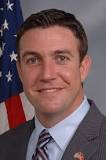By: B.J. Coleman
For The Alpine Sun
Veterans Campaign is on a mission to provide a fresh infusion of leadership talent to serve the nation. The nonprofit organization states its mission simply as, “Training veterans to continue their commitment to service in elected office.” Organized in 2009, Veterans Campaign is a non-partisan, non-ideological educational organization dedicated to training military veterans in the ways of American politics.
By: B.J. Coleman
For The Alpine Sun
Veterans Campaign is on a mission to provide a fresh infusion of leadership talent to serve the nation. The nonprofit organization states its mission simply as, “Training veterans to continue their commitment to service in elected office.” Organized in 2009, Veterans Campaign is a non-partisan, non-ideological educational organization dedicated to training military veterans in the ways of American politics.
Veterans Campaign brought the organization’s efforts to El Cajon’s Cuyamaca College on Friday night, September 26, 2014, sponsoring a debate between the candidates for Congress in the 50th District, both of whom are military veterans.
The debaters were incumbent Republican Congressman Duncan D. Hunter, of Alpine, and his challenger, James Kimber, a Democrat from the northern end of the district. Hunter served in the Marine Corps, including three overseas tours as a field artillery officer after the 9/11 terrorist attacks.
He was elected to Congress in 2008, becoming the first Marine combat veteran of the wars in Iraq and Afghanistan elected to Congress. Kimber served in the Navy, with 20 years on active duty and another 10 as a reservist, providing healthcare to other service members. Kimber now works as a physician’s assistant.
Debate moderators were Seth Lynn, a Veterans Campaign founder, who noted that the contenders had “defended the right to express opinions” with their military service, and local political science professor Carl Luna, who also directs the Institute for Civil Civic Engagement.
If this event is an indicator, the mission of Veterans Campaign may prove to be a rescue mission, restoring civility to political disagreements and improving cooperation among partisan elected officials.
Both Hunter and Kimber continue family traditions of military service. Robert O. Hunter, grandfather of the congressman, was a Marine Corps artillery officer in World War II, and Duncan L. Hunter was an Army Ranger paratrooper and then was predecessor to his son, elected to Congress as a Member of the Class of 1980, serving for fourteen consecutive terms. Kimber’s grandfather and father were both Navy doctors, making for a continuous line of 114 years taking care of other sailors. Both Kimber and Hunter worked their way through college.
Hunter’s wife and three children accompanied him to the debate. Kimber’s mother, Diane Jacobus, who works as a consultant on protocol matters in Long Beach, was also there.
The hour and half allotted for the debate allowed a series of wide-ranging questions, some from the moderators and others from the public.
The candidates’ issue positions align closely with their respective political affiliations. Hunter takes conservative Republican stands based on individual liberty and citizen self-government, focusing on local and federalized control of issues.
Kimber follows the more liberal views of Democrats, placing faith in economies of scale and standardization and equalization of policies from expert control at the national level of government. And, indeed, from the crowd reactions, which disrupted the debate at times, most audience members seemed to have already made up their minds in favor of one or the other.
Questions ranged from military matters that veterans are knowledgeable about, through domestic-focus issues of jobs and the economy, tax rates and government regulatory actions, immigration policies, healthcare policies, and such environmental topics as the California drought, water reserves, local fire dangers, and power and energy sources.
Each man’s views on the military, including how military service had prepared him for public service, tracked closely with the role he had fulfilled while serving in uniform.
Kimber, who provided medical treatment to service members, focused on the military as a model for better provision of government services to citizens across the board. Hunter, the combat field artillery officer, emphasized the military in terms of its central role in national security.
Moderator Luna informed the attendees that polling data show the American people express four times the confidence in the U.S. military that they do in the elected political leaders of the nation. Kimber responded, “The military is about getting the job done.” He contrasted that with the “inaction” he perceives to be afflicting the Members of Congress, identifying the cause as a lack of “compromise” and not enough “working across the aisle.”
Hunter replied that characterization did not describe his experiences serving in the House of Representatives, where he is now in his third two-year term, saying “not so much.” Hunter outlined his bipartisan and bicameral work with Oregon’s Democratic Sen. Ron Wyden and Florida’s Republican Sen. Marco Rubio on the “Student Right to Know Before You Go Act,” requiring that colleges and universities receiving federal student aid dollars provide prospective students with hard numbers on graduation rates, student loan indebtedness and graduates’ starting salaries.
He relayed that the real gap in Washington is between the House and the Senate, with Senate Majority Leader Harry Reid, Democrat from Nevada, refusing action on that and other good pieces of legislation that would benefit the American people. “As we know, the Senate does nothing whatsoever,” Hunter said.
Jacobus, challenger Kimber’s mother, was pessimistic about her son’s chances of winning this election in the Republican-leaning 50th Congressional District.
She admits that her son is engaged in a learning process, and that Kimber supporters really have their sights set on the higher-turnout presidential election year of 2016. She believes her son will be a formidable candidate in a rematch two years from now.
Although both debaters took occasional hard partisan shots at each other, Kimber and Hunter declared agreement on several fronts, such as the need for government policies supporting agriculture and encouragement of a rich mix of energy sources. Both agreed too that their military service had trained them to work with differing colleagues to achieve objectives in common.
Veterans Campaign may really be onto something. These two military veterans faced off as political opponents but still honored their shoulder-to-shoulder military service by behaving toward each other with personal discipline and proper respect.
Luna chided the audience on multiple occasions for booing, hissing and interfering with the speakers’ responses. Twice he admonished the crowd explicitly, asking them to behave with the same dignity and decency that the debaters demonstrated toward each other.
As the Kimber and Hunter shook hands after the debate, Seth Lynn congratulated them for doing a “terrific job on debating the issues.”
He could just as well have congratulated them for a terrific job providing leadership as role models for how citizens should treat fellow Americans when they disagree.












